On a recent Tuesday, the wooden benches in the Harris County courtroom of justice of the peace Lincoln Goodwin, usually warmed by landlords and tenants fighting over eviction cases, were empty. Houstonians who couldn’t make rent were still being removed from their homes—Judge Goodwin’s court has one of the highest caseloads in the country—but the Texas Supreme Court required in January that proceedings be held remotely. Defendants and plaintiffs appeared before Goodwin on a small computer screen, some connecting from their cars, others waiting to be taken off mute or shushing their children once they were patched in. Even though there was no order to be kept, a bailiff stood in a corner of the courtroom, hands on his belt.
Twenty cases waited on Goodwin’s docket that morning. Tenants at risk of eviction included frontline health-care workers, church volunteers, young families, middle-aged couples, and Texans who lived alone. Among the last group was Evelyn Powers, a 36-year-old warehouse supervisor who moved last August to a small house in Spring, and then was unable to make full rent following a bout with COVID-19. In mid-October, Powers fainted on the job, and woke up days later in a hospital on life support. For the next few weeks, she struggled to breathe, walk, and do other basic tasks, and was furloughed from her job shortly thereafter. Powers’s family had pooled money to help out during her recovery, but while they scraped together enough to pay off her basic utilities, they could only make about half of her $2,100 rent.
Powers said her landlords told her they faced foreclosure if she didn’t pay rent. They filed a formal eviction with Goodwin’s court on November 23, then pushed off the hearing twice so Powers could look into assistance programs. But Powers said dialogue had broken down when she asked her landlords to opt into an assistance application alongside her.
Two clerks, sitting behind plexiglass barriers, checked in tenants and landlords one by one over Zoom, asking for their full names and callback numbers in case they lost connection during their hearing. Ten tenants were absent, meaning the court ruled in favor of the landlords by default before Goodwin even sat down at his bench. Several other tenants connected without knowing when their hearings were scheduled, or the statuses of their cases altogether. In one instance, a clerk informed a young woman her case had already been abated by a U.S. Centers for Disease Control moratorium on certain evictions, meaning she wouldn’t have to vacate her apartment until after March 31, when the CDC order expires. “Oh, my God,” the tenant said, her voice shaking.
“Unless you still want to speak with the judge,” the clerk clarified.
“No, thank you,” the woman replied, with a relieved laugh, then promptly left the Zoom call.
When Goodwin finally entered the courtroom after all tenants and landlords had checked in, the bailiff shouted, “All rise!” The two clerks stood. Powers prepared to make her case. Goodwin adjusted his computer screen and smoothed his hair. He first addressed landlords, advising that they could only ask for back rent—no late fees or other additional charges. Then he spoke to tenants. “I understand these are hard cases. Hard for you, and hard for me, frankly,” he said. “Just because we’re proceeding today, don’t assume we’ve left humanity at the door.”
Since last March, when the COVID-19 pandemic upended the economy, Houston has become a hot spot for evictions. According to Eviction Lab, a nationwide research organization, more than 26,000 evictions have been filed in the Houston metro area during the pandemic—double the total of Austin and Fort Worth, the two other Texas cities Eviction Lab tracks, combined. In the week after millions of Texans were left without water and electricity, there were 607 cases filed in Houston. Black and Latino Americans, who are twice as likely to be renters as non-Hispanic whites, have borne the brunt of evictions.
The reasons for the crisis in Houston are manifold. Unlike Austin and many other cities across the country, Houston has not passed a local eviction moratorium atop the CDC one, which has always been restricted in its scope and meant to slow COVID cases caused by evictions, not to stop proceedings altogether. In Harris County, CDC orders had temporarily blocked only about 10 percent of cases as of the end of 2020. To qualify for one, tenants must fall below certain income thresholds and prove that, if forced out of their homes, they would become homeless. Some Houston tenants, particularly the 3 percent with legal aid, have been able to successfully argue they meet those requirements. One successful tenant is Chanda Hamilton, a mother of four with Hodgkin’s lymphoma who was forced to quit her job as a hairdresser and seek immediate medical treatment. But defendants in civil court cases don’t have a constitutional right to an attorney, and unlike a handful of cities, including Philadelphia, New York, and San Francisco, Houston has not guaranteed that right in eviction proceedings. (The Harris County Housing Stability Task Force recently issued a recommendation to establish it.) For those 97 percent without representation, arguing that they meet the CDC order’s requirements has proven tough. Judges have interpreted the order’s broad language in different ways: one justice of the peace in Houston ruled that a woman could be evicted, despite the moratorium, because she could move in with her parents—even though she insisted she didn’t have a relationship with them.
Goodwin’s court has seen the largest number of eviction cases in Harris County since last March. In his court, only 15 percent of those challenging their evictions have claimed protection from the CDC order. Lawyers with Lone Star Legal Aid, a firm that represents some tenants in Harris County eviction cases, told me they’ve seen some landlords circumvent the CDC order by citing lease violations, from smoking on the property to hosting a friend for more than three nights in a row. One young man in Goodwin’s court alleged that his landlord had shut off his water to force him out.
At 11 o’clock on the Tuesday I observed the court, Powers appeared on the screen. “Evelyn, are you here?” Goodwin asked. After a long pause, Powers affirmed that she was. With the typical awkwardness of Zoom introductions behind her, she proceeded to tell Goodwin that she had not delivered a CDC declaration to him because she wanted to sign up for one of the many rental assistance programs offered in Harris County. But she said she had been unable to complete the application process because her landlords, Mark Karimi and Afshin Zadeh, who own at least two properties in Houston, had not agreed to it. (Zadeh declined multiple requests for an interview for this story, and Karimi could not be reached as of press time.)
Powers’s landlords told Judge Goodwin they had attempted to contact her to strike a deal, but she had failed to reply. “We never received anything from her,” one of her landlords said. Powers replied, static sounds from her cell phone competing with her voice, that she had only ever interacted with one of the two landlords on her lease and didn’t know who the “we” that he referred to was. The two parties began to speak over each other.
During the back-and-forth, Goodwin rubbed his temples. “If both parties are interested, we can reset,” he said. Rescheduling the hearing for a future date would push the eviction date further down the road and give Powers time to work out a deal with her landlords. They declined. They wanted her out; Powers owed $7,300.
Goodwin once again seemed frustrated and suggested another reset, but this time asked if the two parties could make a deal “outside the courts.” Goodwin said he could reschedule the hearing for March 1, if Powers agreed to move out before then and her landlords to drop the charges. The practice would amount to an eviction without all the paperwork: while the landlords would lose out on what Powers owed them, she would have to vacate her apartment, but without an eviction going on her record and hurting her chances of signing leases in the future. Powers’s landlords indicated they’d agree if they got back rent and if the property were vacated in only ten days rather than at the end of the month, but Goodwin shut down further discussion. “Be realistic,” he said. “That’s not enough time.” Ultimately, the two parties agreed: Powers would pack all her things and move out by March 1, or risk formal eviction.
“I don’t know where I’m gonna go,” Powers told me on the phone after her hearing.
Throughout the morning, the process repeated itself. A few landlords were interested in rental assistance or diversion programs for their tenants, and Goodwin rescheduled their hearings for later in the month. The judge also reset one hearing for two tenants who had given their landlord a CDC order but not properly filed it with the court, so that they might do so before the rescheduled appearance. But for the majority of cases, when given no other option, Goodwin opted to reset the hearing date, as he had with Powers, to give the tenant time to move out without an eviction on record. Just after 11:30 a.m., Goodwin and the clerks exited the courtroom to prepare for the afternoon docket, when dozens more tenants and landlords would receive decisions on their cases.

For tenants a judge rules against, the hearing is just the beginning of the eviction process. Next comes a scramble to find a new home, and then, for some, homelessness. When the mid-February winter storm and the utility-grid blackout damaged homes across the state, Powers was left without water and heat for three days. Unable to drive to the store to buy boxes and too cold to pack, she lost a week to prepare for her March 1 move-out date. She asked her landlords if they could move the agreed-upon date back a week, to March 5, but she says her landlords weren’t interested.
Both Powers and her landlords showed up to court again on March 1, disregarding the informal plan Goodwin facilitated in February. Powers pleaded for more time to pack because of the winter storm. Goodwin ruled that Powers’s landlords could pursue a notice to vacate as soon as March 10. “I got the week that I wanted,” Powers said. “Maybe not the way that I wanted it, but I got it.”
The Texas Supreme Court gave the all-clear for in-person proceedings to resume on March 5, which means tenants and landlords will soon fill the benches in Goodwin’s court. When the CDC moratorium is lifted March 31, housing activists expect a “tsunami” of evictions will follow. For those who end up in situations like Powers’s, the end of the moratorium could represent a catastrophe with far-reaching consequences.
When Powers last spoke with me, her plans were still up in the air. A friend had paid six months down on a storage unit so Powers could keep her possessions safe while looking for steady housing. Her tentative arrangement had been to stay with a second friend until she could get back on her feet, but then her friend’s ceiling collapsed when a pipe burst following the winter storm. Powers was now considering staying at her sister’s home or, perhaps, a shelter.
She expressed faith that “God was not sleeping” and that she’d land on her feet. But she said she was unable to accept that her landlords would throw her out like this. “I understand for [them] it’s just business,” she said. “For me, it’s personal.”
- More About:
- Politics & Policy
- Houston






